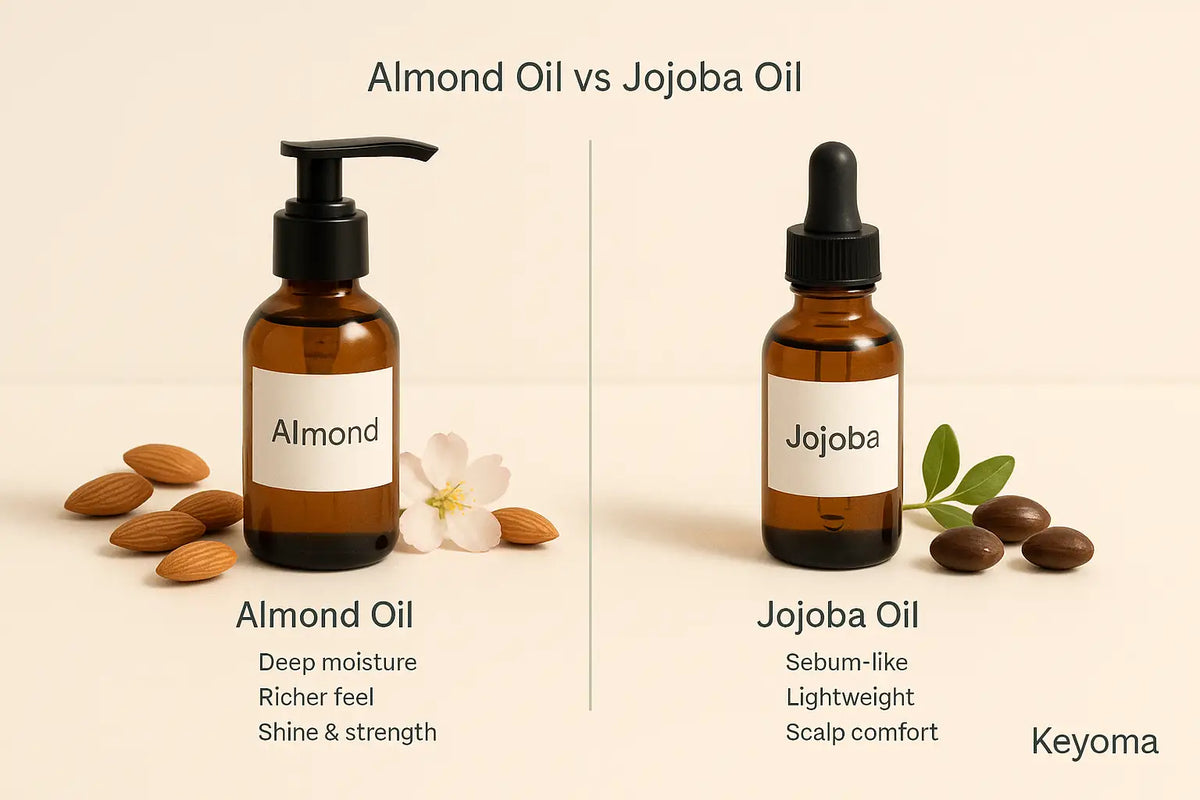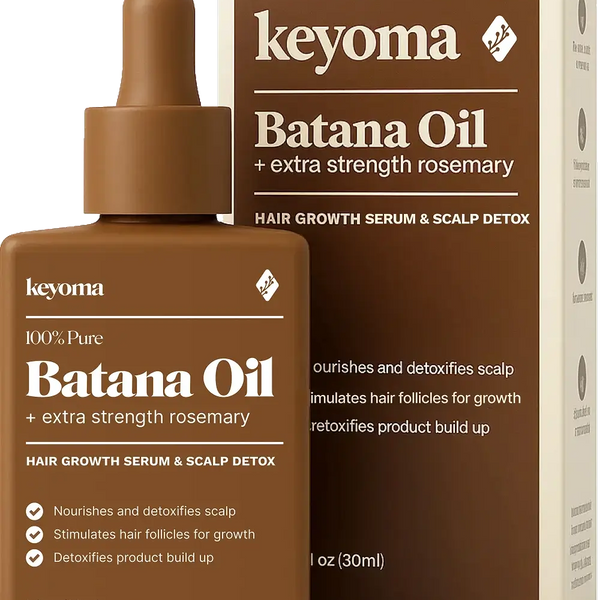Last updated
Aug 26, 2025
Almond Oil vs Jojoba Oil: Find Your Best Match
Published on
Aug 26, 2025

In this article
The almond oil vs. jojoba oil debate sits within a surge of natural plant oils for skin and hair, part of a broader move toward cleaner, more sustainable beauty and personal care.
As you look more closely at what goes into your routine, you may prefer options seen as more natural and planet friendly. Plant oils keep rising because they are flexible to use and carry a range of nutrients.
With that in mind, knowing how almond oil vs. jojoba oil differ helps you build a hair or skin routine tailored to you. At the same time, understanding each oil’s traits helps brands create targeted formulas for specific hair or skin types.
Key Takeaways
-
Almond oil contains vitamins and antioxidants that can moisturize, soften lines, and soothe.
-
Jojoba oil is a wax ester that mimics sebum and can balance oily skin.
-
For hair, jojoba supports scalp comfort and dandruff care, while almond supports strength.
-
Choice depends on needs, jojoba absorbs quickly, almond feels richer and absorbs more slowly.
What Is Almond Oil?
Almond oil comes from almonds, the edible seeds of the almond tree. There are sweet and bitter varieties of almond trees. Producers press raw almonds without chemicals or high heat to create sweet almond oil. This method keeps most nutrients intact. It has no preservatives and is the preferred option.
Almond Oil: Nutrient Profile
Almond oil brings a strong nutrient lineup. It’s rich in:
-
Vitamin E: A potent antioxidant that shields skin from free radical damage
-
Vitamin A: Important for cell turnover and overall skin health
-
Omega-3 fatty acids: Key for maintaining skin elasticity and moisture
-
Zinc: Supports healing of acne and helps calm inflammation
-
Potassium: Helps maintain proper moisture balance in the skin
Almond Oil: Skin Benefits

Deep Moisturizing
Almond oil sinks into the skin to deliver deep hydration and can improve tone and complexion. It is especially helpful for dry or sensitive skin.
Anti-Aging Benefits
Thanks to its high vitamin E content, almond oil can soften fine lines and wrinkles. It also supports elasticity and gives some protection from UV stress.
Reduce Scars and Stretch Marks
Using almond oil regularly may help fade the look of scars and stretch marks, improving how skin appears overall.
Treat Dark Circles
Vitamin K in almond oil may help lessen under-eye dark circles and puffiness.
Gentle Cleanser
You can use almond oil as a mild, natural cleanser to lift dirt and excess oil from skin.
Almond Oil: Hair Benefits

Nourishes Hair
Almond oil can strengthen strands, reduce shedding, and help with scalp issues like dandruff. Its light feel suits most hair types, from fine to coarse.
Enhances Shine
Vitamins and minerals in almond oil may boost shine and support overall hair health.
Supports Scalp Health
Almond oil’s moisturizing action can soothe an itchy scalp and help reduce dandruff.
Ways to Use Almond Oil
For Skin: Use it as a night serum to help repair and refresh skin. Gently massage a few drops onto clean, damp skin.
For Hair: Apply to scalp and lengths, leave 30 minutes or overnight, then wash for smooth, soft hair.
As a Massage Oil: Its light texture makes it a good choice for body massage, helping relaxation and skin comfort.
What Is Jojoba Oil?
Golden jojoba oil offers vitamins, antioxidants, and anti-inflammatory support like many facial oils, but it stands out because it is a wax ester, not a true oil.
The hardy jojoba plant, native to North American deserts, yields oil from its seeds. Cold pressing extracts the oil, which makes up about half the seed, and preserves its nutrition.
Jojoba Oil: Skin Benefits

Moisturizing Strength
Jojoba oil is a strong moisturizer, giving long-lasting hydration without clogging pores. Its structure lets it penetrate deeply and form a barrier that locks in moisture.
Regulates Sebum
If you have oily or acne-prone skin, jojoba can help. It mimics sebum so closely that it may signal skin to slow oil production.
Anti-Inflammatory Benefits
Packed with antioxidants and fatty acids, jojoba oil can calm irritated skin. It is often used for issues like eczema, psoriasis, or sunburn.
Antioxidant Support
Natural forms of vitamin E in jojoba act as antioxidants to help shield skin from everyday stressors.
Noncomedogenic Qualities
Even with its oily feel, jojoba is noncomedogenic, meaning it will not clog pores. It suits all skin types, including acne-prone skin.
Jojoba Oil: Hair Benefits

Promotes Scalp Health
Use jojoba oil as a conditioner to help prevent split ends, breakage, and dryness. It also moisturizes the scalp and can help with dandruff.
Supports Hair Growth
By keeping the scalp comfortable and hydrated, jojoba oil may support a healthy environment for hair growth.
Protects Against Damage
Its fatty acids and antioxidants can help defend hair from heat and environmental stress.
Ways to Use Jojoba Oil
For Skin: Smooth a few drops onto your face after cleansing to lock in moisture. Use it morning or night.
For Hair: Massage into scalp and ends. Leave 20 minutes before washing, or use as a leave-in conditioner. For me, a pea-size amount prevented greasiness and felt noticeably lighter overall.
As a Carrier Oil: Jojoba works well as a carrier for essential oils, helping their absorption and benefits.
Jojoba Oil vs. Almond Oil: Key Differences

Best Fit by Skin Type
Oily/Acne-Prone Skin: Jojoba oil leads here. It will not clog pores, and its sebum-balancing action fits oily or acne-prone skin.
Dry/Sensitive Skin: Almond oil is a better match for dry or sensitive skin. Its rich, emollient feel gives deep hydration and soothing benefits.
Combination Skin: Both oils can work, though jojoba might edge ahead thanks to its balancing nature.
Hair Care Comparison
For Scalp Health: Jojoba oil shines for scalp comfort and dandruff care. Its similarity to natural sebum helps maintain a healthy scalp.
For Hair Strength: With its robust nutrient profile, almond oil is strong for reducing breakage and supporting strength, especially on dry or damaged hair.
For Shine and Softness: Both can boost softness and shine, but almond oil may have a small advantage due to more vitamin E.
Anti-Aging Effects
Jojoba Oil: Helps create a protective barrier and supports elasticity. Antioxidants help fight free radicals linked to aging.
Almond Oil: Rich in antioxidants and vitamins, it may better combat free radicals and soften visible lines and wrinkles.
Texture and Absorption
Jojoba Oil: Has a lighter feel and absorbs fast, leaving no greasy film. That makes it ideal for daytime use or if you dislike heavy textures.
Almond Oil: Feels slightly heavier and absorbs more slowly. It suits nighttime routines or anyone who prefers a richer finish.
Versatility and Uses
Jojoba Oil: More versatile because it closely resembles sebum. It fits a wider range of products and skin types.
Almond Oil: Useful across skin and hair care, and it also has culinary uses, giving it broad appeal.
Choose Your Oil and Build a Simple Routine with Keyoma
When you compare jojoba oil vs almond oil for personal and hair care, both can be helpful depending on how you use them. Jojoba oil may suit minimal routines and light grooming, while almond oil might fit longer, richer applications or more targeted care.
If you are curious about almond oil for daily use, its flexibility can make it a staple across steps, though its richer feel will not suit everyone. You do not have to pick only one. Many people keep both and switch by season, hair texture, or habits to balance lightness with richness.
Featured Product
100% Pure Batana Oil + Rosemary
Learn more about Batana Oil
Your Cart
Your Cart is empty
Let's fix that
You might like...
Search our store








